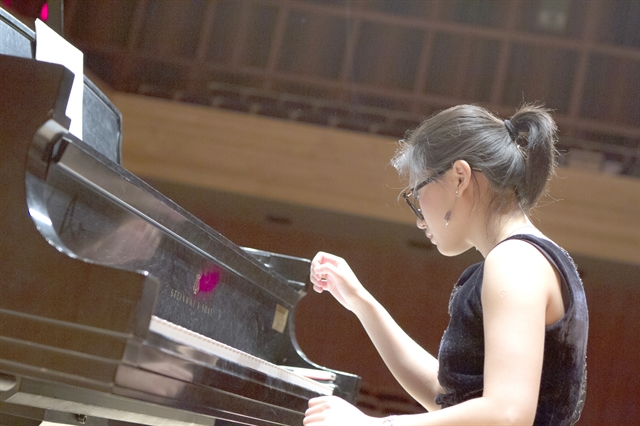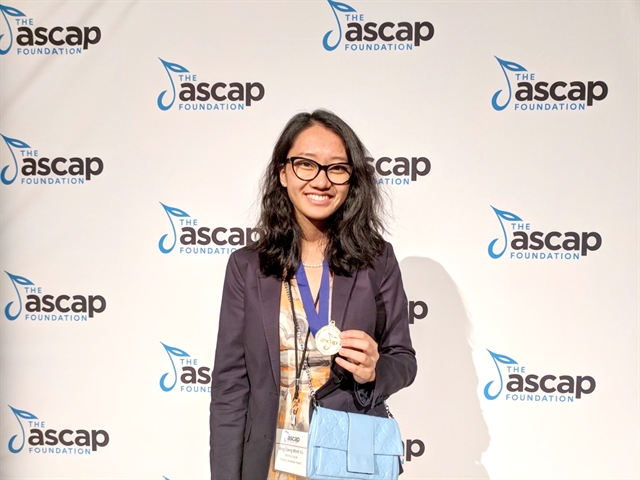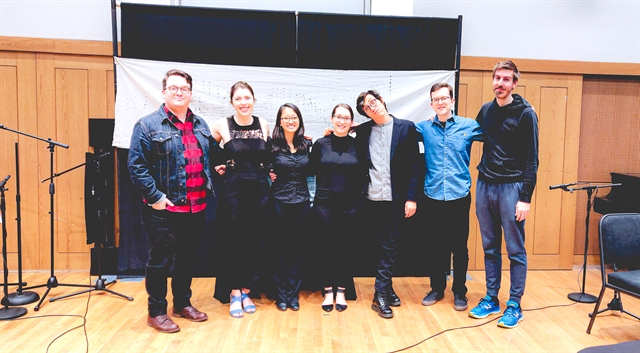 Features
Features

Vũ Đặng Minh Anh is Polish of Vietnamese descent and began studying piano aged five in Warsaw, where her love for music was nurtured by her mother, musician Đặng Hồng Anh.

|
| ON SONG: Vũ Đặng Minh Anh during her senior recital at Hatch Hall, Eastman School of Music in May 2017. Photos courtesy of Vũ Đặng Minh Anh |
By Nguyễn Bình
Award-winning composer Vũ Đặng Minh Anh, also known as Ania Vu, is preparing for her participation in the Tanglewood Music Festival.
The 26-year-old was greatly looking forward to the event in the Massachusets State, the US. But then came the coronavirus pandemic, forcing the organisers to move to an online event.
The festival will run from July until mid-August 17, and Anh will perform as a composer.
"Being accepted to Tanglewood for two months felt like winning the lottery," said Anh.
"Only six to eight composers are admitted every year with no restrictions on age or nationality. Among musicians, it's considered one of the most prestigious music festivals in the US."
Normally, each composer has about five performances of their pieces throughout the festival including one piece being written during the festival with the guidance of the composition faculty.
However, for the online version this summer, the festival organisers are still deciding how to run it so Anh is still waiting to hear more about the details.
Anh is Polish of Vietnamese descent and began studying piano at five in Warsaw, where her love for music was nurtured by her mother, musician Đặng Hồng Anh.
She later studied at the American School of Warsaw and Karol Szymanowski Academy of Music. She received her Bachelor of Music in composition and theory from the Eastman School of Music in 2017.
At a very early age, she won awards at Concours Musical de France, Concurso International de Piano Ciudad de San Sebastian, International Piano Competition Val Tidone, and International Piano Competition S. Bach.

|
| ACCOMPLISHED: Vũ Đặng Minh Anh at the ASCAP Foundation Award, recipient of an Honourable Mention in 2017. |
Her most recent award was Honourable Mention for a young composer from the ASCAP Morton Gould for her first submitted piece for a string quartet. It is about 18 minutes long and comprises of four movements.
"My most substantial work during my time while studying at Eastman," Minh Anh said.
"When this piece was completed in 2016, it was true to my musical language then, but now that language seems far from what I write now.
"In fact, I just wrote a new piece again for a string quartet in November, but its style and sounds are very different compared to the older one. It’s interesting for me to see how my music has developed throughout these three years.
"I’m glad that my language has changed – it means that I’m still evolving as a composer."
Minh Anh is now studying for a PhD as a Benjamin Franklin Fellow at the University of Pennsylvania. In her last semester of coursework, she is studying computer and electricity.
Her goal is to gain more exposure to various subjects beyond what she knows could benefit her as a composer.
During this past spring semester, she took a course in programming languages and another course that focuses on the basic of electricity, soldering, making contact microphones and experimenting with electronic prototyping platform Arduino.
The first course was a non-beginner course for undergraduate students who want to major or minor in computer science. Aside from being necessary for her growth, she enjoys discovering fields that are completely new to her.
"I have only scratched the surface, and the interaction with these tools has already opened up new possibilities in my future work," said Minh Anh. "Whether such media will end up being part of my work remains to be seen."
Her music has been performed by the MIVOS and Daedalus Quartets, TAK Ensemble, International Contemporary Ensemble, and the Iridium Saxophone Quartet, and at several festivals including Tage Neuer Musik in Regensburg (Germany), Valencia International Performance Academy (Spain), Red Note New Music Festival (USA), and SoundSCAPE (Italy).
SoundSCAPE in Cesena, Italy was special to her because the piece she wrote for the festival was a personal creative breakthrough.
She was asked to write a vocal piece and spent several weeks looking for a good text to set the music to but failed to find anything she liked.
As the deadline was approaching she became more desperate and decided to write the text herself.
She never thought she would be writing words to her music because she was never trained to do so. But as she started she was surprised at how much she enjoyed working on this creative aspect too.
She approached writing text as a composer, meaning she was treating words as sounds while still making sure they formed a meaningful narrative.
The poem in Polish that resulted from this unexpected and creative adventure was a play of sounds, systematic addition and subtraction of syllables, and new words resulting from such processes, according to Minh Anh.
Since then, she has written more poems that have influenced her music writing process. This interest in text makes sense given her fluency in several languages, according to her composition teacher Prof James Primosch.
"Recently she has been exploring text as part of the fabric of her compositions, including texts she has devised herself," the professor said.
"Vu [Minh Anh] is an exceptionally gifted pianist, and her musicianship skills of every kind are outstanding. Her compositions benefit from her grounding in the physical realities of music-making.
"I find her music to be uncommonly sensitive to harmonic colour. She deploys strongly profiled motifs in vivid and characterful ways. Her sense of timing is excellent; her pieces never feel like they overstay their welcome."
Prof Primosch has worked with Minh Anh in both classes and individual composition lessons at the university.

|
| IN IT TOGETHER: Đặng Vũ Minh Anh (third from left) and her colleagues at a concert Rose Recital Hall, University of Pennsylvania, December 2019 to premiere their works. |
Having taught music theory and ear training at the university, she enjoys teaching a lot and would ideally like to work in an academy as a professor while still having time to compose and perform.
Outside of music, Minh Anh has a passion for languages and speaks fluent English, Polish, French, and Vietnamese, in addition to having studied Latin and German.
That explains why she can write text in French and Polish. She likes both writing instrumental and vocal pieces because each feels very different.
She is hoping to soon write in her mother tongue Vietnamese. "But it will not be easy considering the different tones," she said. VNS




